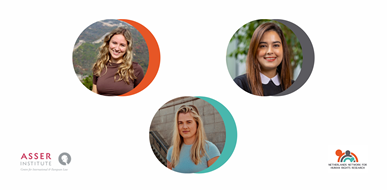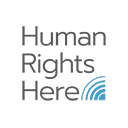[Spotlight] Meet our PhDs!
Published 9 September 2025
The Network has many PhD members, conducting innovative research on human rights. To get to know them and their research better, we interviewed them!
Lisa van Roermund

Lisa van Roermund is conducting her PhD at Radboud University in Nijmegen. Her PhD research focuses on future artificial reproductive technologies (ARTs), such as mitochondrial replacement therapy (MRT), in vitro gametogenesis (IVG), and ectogenesis, and Dutch parentage law. For her research, she uses ethical analysis and focus on human rights and children’s rights, including the right to identity. When asked about the most surprising outcome she had discovered so far, Lisa answered that tuture ARTs have significant implications for the concept of parenthood. As biological possibilities expand, the definition of ‘biological parenthood’ becomes increasingly unclear, blurring the line between biological and legal parenthood and necessitating reform of Dutch parentage law. On the practical application of her research, Lisa said that the future legislator will need to reform Dutch parentage law, as several challenges will arise. For instance, in the case of complete ectogenesis, a child will not have legal parents soon after birth. It is important to anticipate future ARTs and the challenges they create, and start considering potential reforms now. Finally, Lisa told us about a common misconception about her area of research, namely that the technologies she researches are often perceived as ‘science fiction’. However, MRT is already in use in countries such as the UK, and research on IVG and ectogenesis is well advanced, including ongoing studies in the Netherlands.
Noor Swart

Noor Swart is a PhD Candidate at the University of Groningen. Her research focuses on the right to protest in the Netherlands. She specifically examines several complex situations in which this right comes into conflict with other fundamental rights, for instance in case of protests in front of abortion clinics or private residences. According to Noor, one important point to understand is that, in the Netherlands, local authorities do not have a legal basis to explicitly take the rights of others (such as the right to privacy) into account when regulating protests. This can make it difficult to reach a balance between those rights. In other countries, such as Germany and England, the law does more explicitly integrate this possibility. In practice, local authorities often struggle with cases where the right to protest intersects with other fundamental rights. That is why Noor studies how such cases are regulated in the Netherlands and other countries, how the ECHR assesses such situations, and whether there is a need for legal reform. When asked about a common misconception about her area of research, Noor answered that people believe one needs official permission to hold a protest, or that authorities have broad legal grounds to restrict demonstrations. In reality, restrictions are only permissible when they are necessary to achieve three specific legitimate aims (health, traffic, disorder), and authorities need to clearly justify why such restrictions are necessary.
Aimen Taimur

Aimen Taimur is a PhD Candidate at the Tilburg Institute for Law, Technology and Society (TILT) of Tilburg University. Her PhD examines freedom of thought in the context of artificial intelligence and the ways in which manipulative algorithms and design can interfere with it. The project explores how human rights law, particularly the ECHR and the UDHR, together with key EU regulatory frameworks such as the GDPR, the AI Act and the DSA, can help protect cognitive freedom against subtle forms of technological manipulation. It asks how far existing frameworks go in safeguarding our mental space and what new approaches might be needed to defend one of the most fundamental rights in an increasingly data-driven society. Aimen was struck by how freedom of thought, once seen mainly as protection against state coercion, is ill-equipped to address technological influence. The challenge lies in defining what counts as manipulation. Influence is constant in human life, but when it is engineered by AI to exploit cognitive vulnerabilities, it edges into something more invasive. Drawing that line has proven far more complex than she expected, and it is precisely where law and emerging technologies now collide. When asked what people should really know about her research, Aimen answered that her research is not about condemning all forms of influence but about asking when influence becomes manipulation that threatens freedom of thought. What people should know is that this is not a futuristic concern. The technologies we use daily already have the capacity to shape how we think and decide. Understanding where the line lies between persuasion and manipulation is essential, because protecting cognitive freedom is not only about abstract rights, it is about preserving the very space in which we form our choices and identities. On her PhD's practical application, Aimen said that her work looks at how we can build real safeguards for freedom of thought. On one level this means courts using more flexible remedies when manipulation through technology is at issue. On another, it means requiring protections to be built into technology itself, much like GDPR’s approach to privacy by design. By combining legal adaptability with technical responsibility, the research aims to show how cognitive freedom can be defended in everyday digital environments rather than only in theory. According to Aimen, a common misconception about her area of research is that the risks are sci fi. They are mostly subtle and already here. The interesting legal problems start in the everyday scroll on our phones, not in a lab. Recent controversies, from political microtargeting to large scale data operations, show how influence can scale quickly and quietly.
Be featured on PhD Spotlight!
Would you like to be featured on PhD Spotlight? Then complete this form and send it, alongside a portrait photograph of yourself, to nnhrr@asser.nl with the subject line "PhD Spotlight - your name".


